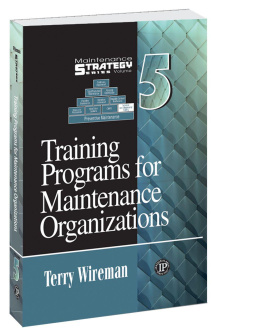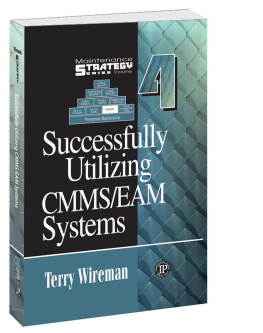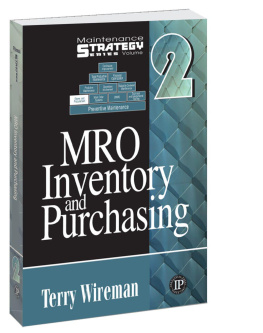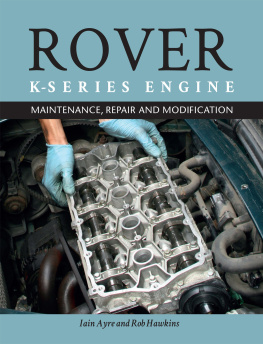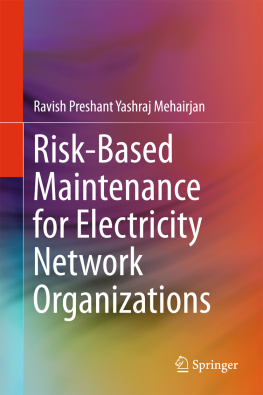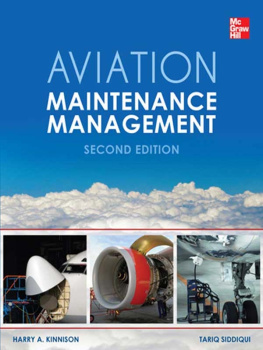Wireman - Training Programs for Maintenance Organizations: Maintenance Strategy Series
Here you can read online Wireman - Training Programs for Maintenance Organizations: Maintenance Strategy Series full text of the book (entire story) in english for free. Download pdf and epub, get meaning, cover and reviews about this ebook. year: 2013, publisher: Reliabilityweb com, genre: Romance novel. Description of the work, (preface) as well as reviews are available. Best literature library LitArk.com created for fans of good reading and offers a wide selection of genres:
Romance novel
Science fiction
Adventure
Detective
Science
History
Home and family
Prose
Art
Politics
Computer
Non-fiction
Religion
Business
Children
Humor
Choose a favorite category and find really read worthwhile books. Enjoy immersion in the world of imagination, feel the emotions of the characters or learn something new for yourself, make an fascinating discovery.
- Book:Training Programs for Maintenance Organizations: Maintenance Strategy Series
- Author:
- Publisher:Reliabilityweb com
- Genre:
- Year:2013
- Rating:3 / 5
- Favourites:Add to favourites
- Your mark:
- 60
- 1
- 2
- 3
- 4
- 5
Training Programs for Maintenance Organizations: Maintenance Strategy Series: summary, description and annotation
We offer to read an annotation, description, summary or preface (depends on what the author of the book "Training Programs for Maintenance Organizations: Maintenance Strategy Series" wrote himself). If you haven't found the necessary information about the book — write in the comments, we will try to find it.
Wireman: author's other books
Who wrote Training Programs for Maintenance Organizations: Maintenance Strategy Series? Find out the surname, the name of the author of the book and a list of all author's works by series.
Training Programs for Maintenance Organizations: Maintenance Strategy Series — read online for free the complete book (whole text) full work
Below is the text of the book, divided by pages. System saving the place of the last page read, allows you to conveniently read the book "Training Programs for Maintenance Organizations: Maintenance Strategy Series" online for free, without having to search again every time where you left off. Put a bookmark, and you can go to the page where you finished reading at any time.
Font size:
Interval:
Bookmark:

www.terrywireman.com
TLWireman@Mindspring.com
Reliabilityweb.com
Maintenance Strategy Series
Volume 5
Training Programs for Maintenance Organizations
Terry Wireman
ISBN 978-1-939740-14-4
Copyright 2013 Reliabilityweb.com
Printed in the United States of America All rights reserved.
This book, or any parts thereof may not be reproduced, stored in a retrieval system, or transmitted in any form without the permission of the publisher.
Opinions expressed in this book are solely the authors and do not necessarily reflect the views of the Publisher.
Publisher: Terrence OHanlon
For information: Reliabilityweb.com
www.reliabilityweb.com
PO Box 60075, Ft. Myers, FL 33906
Toll Free: 888-575-1245 | Phone: 239-333-2500
Email:
TABLE OF CONTENTS
The Perfect StormAn Aging Workforce
A Compromised Educational System
The Lack of Technical Apprenticeships
The 2008-2009 Economy
Concluding ThoughtsDeveloping the Training Program
Delivering and Evaluating the ProgramIntroduction
Skills Trades Training Program Case Study
The Duty Task Needs Analysis
PitfallsBackground Influences
Whos in Charge?
The TrainersConsiderations for Instructional Objectives
What Is an Instructional Objective
Why Care About Objectives?
Where Objectives Originate
Creating Objectives
Pitfalls to Developing Instructional Objectives
Summary
Checklist for TrainersSelecting Content
Module Components
Delivery System Selection
Demonstrating Trainee Competency
The Lesson Plan
Try Out the Lesson
SequencingWhat Is a Trainer?
Learning How to Train
Selecting Trainers
Reflections for Technical TrainersBuilding a Structured OJT System
OJT Conflicts
When to Use OJT
From Unstructured to Structured OJT
Components of an OJT System
OJT Training Materials
Tracking and Report Generation
Implementation
OJT Training Procedures
OJT MythsCalculating ROI (Return on Investment) for Training
Indicators Specific to Technical Training
Problems with Technical Training ProgramsPerformance Discrepancies
ROI and Training
Developing an Action Plan
Is Training Appropriate?
SummaryBaby Boomers
Generation X and Y
Training RequirementsCritical Equipment and Specialty Skills
Knowledge Capture
Artificial Intelligence and Explicit Knowledge
INTRODUCTION
Volume 5 Training Programs for
Maintenance Organizations
Volume 5 of the Maintenance Strategy Series builds on the previous four volumes. One might wonder why we have waited so long to address training for maintenance organizations; however, many of the strategies discussed in the previous four volumes must be in place to provide the information necessary to developing good training programs. As will be shown in this volume, the strategies discussed previously build the needs foundation for the training requirements.
It becomes critical at this point in the development of maintenance strategies that the skills of the individuals in the organization be addressed. It will be virtually impossible to move a maintenance organization into the predictive and reliability-based programs without guaranteeing a solid skill foundation. In addition, much of the training that is to be developed can be utilized to train operators, who will be involved in performing some basic maintenance tasks. The additional utilization of the training will be highlighted in Volume 6 of the Maintenance Strategy Series, Operations and Team-Based Maintenance Activities , which also highlights team-based maintenance activities.
In Volume 5, we will discuss the current problems facing maintenance workforces. Rather than presenting these problems as insurmountable obstacles, the text will develop the process to overcome them. It begins with a foundation training program that should be required for all skilled trades personnel. In addition, the text will look at how to develop advanced training that addresses specific trade needs of the trainees. Further, the text will consider how to develop equipment specific training that will enable companies to fully utilize their assets.
Although many of the concepts have been in the training realm for years, they have not been directly applied to training a technical workforce. This text will make that application. In addition to the theoretical material, the text will present actual examples from existing technical training programs. Many of the examples related in this volume will be based on the experience the author has gained developing and implementing a comprehensive maintenance skills training program while working at a major integrated steel company. This program processed approximately 200 individuals from apprentices to journeyman level technicians every four years. Additional examples will be drawn from client projects where similar comprehensive technical skills training programs have been developed.
OVERVIEW
The Maintenance Strategy Series Process Flow
Good, sound, functional maintenance practices are essential for effective maintenance / asset management strategies. But what exactly are good, sound, functional maintenance practices? The materials contained in this overview (and the overview for each of the volumes in the Maintenance Strategy Series) explain each block of the Maintenance Strategy Series Process Flow. They are designed to highlight the steps necessary to develop a complete maintenance / asset management strategy for your plant or facility. The activities described in the Process Flow are designed to serve as a guide for strategic planning discussions. The flow diagram for the Maintenance Strategy Series Process Flow can be found at the end of this overview.
Authors Note
Many individuals may believe that this type of maintenance strategy program is too expensive or time consuming to implement, especially when there are advanced predictive or reliability techniques that might be employed. Yet there is a reason for the sequencing of the Maintenance Strategy Series process flow. If attempts are made to deploy advanced techniques before the organization is mature enough to properly understand and utilize them (basically, the I want results now short-term focus), they will fail. The reason? Developing and implementing a sustainable maintenance / asset management strategy is more than just distributing a flow chart or dictionary of technical terms. It is an educational exercise that must change a company culture. The educational process that occurs during a structured implementation of basic maintenance processes must evolve into more sophisticated and advanced processes as the organization develops the understanding and skills necessary.
If an individual is to obtain a college degree, it may involve an investment of four or more years to achieve this goal. Likewise, if a company is to obtain an advanced standing in a maintenance / asset management strategy, it may take up to four years. It is not that someone cannot, through years of experience and education, design their maintenance / asset management process in a short time period. It will, however, take the entire organization (from senior executive to shop floor employees) this amount of time to become mature in their understanding and utilization of the process. Although there will be incremental benefits achieved along the journey to maintenance / asset management excellence, the true benefits are not realized until there is a complete organizational focus on maximizing all aspects of the investment in the assets. It is this competitive focus that separates long-term, sustainable success from a short-term flash of improvement.

Font size:
Interval:
Bookmark:
Similar books «Training Programs for Maintenance Organizations: Maintenance Strategy Series»
Look at similar books to Training Programs for Maintenance Organizations: Maintenance Strategy Series. We have selected literature similar in name and meaning in the hope of providing readers with more options to find new, interesting, not yet read works.
Discussion, reviews of the book Training Programs for Maintenance Organizations: Maintenance Strategy Series and just readers' own opinions. Leave your comments, write what you think about the work, its meaning or the main characters. Specify what exactly you liked and what you didn't like, and why you think so.

